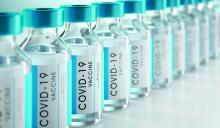Vaccination against SARS-CoV-2 appears to protect people with inflammatory bowel disease (IBD) from the more serious consequences of breakthrough COVID-19 infections, but results may vary by which vaccine was received, results of a small study suggest.
In a study of patients with IBD who had completed a primary vaccine series but went on to develop COVID-19, there were trends toward worse outcomes for patients who received a non-mRNA vaccine, older patients, and those who were on combination therapy rather than monotherapy, reported Emily Spiera, a medical student at the Icahn School of Medicine at Mount Sinai, New York.
“Overall, we saw that vaccinated patients who subsequently developed COVID-19 had low rates of hospitalization, severe COVID, and death,” she said in an oral abstract at the annual Crohn’s & Colitis Congress®, a partnership of the Crohn’s & Colitis Foundation and the American Gastroenterological Association.
The study was conducted before the highly infectious Omicron variant of SARS-CoV-2 became dominant, however, and the sample size of 88 patients, combined with a low number of study events, was too small for statistical significance to emerge for most measures, Ms. Spiera acknowledged.
Nonetheless, the findings support the protective benefit of vaccines in this population, said Freddy Caldera, DO, associate professor of gastroenterology at the University of Wisconsin–Madison, who was not involved in the study.
“In my mind, when we think about COVID vaccines, the whole goal is to prevent severe disease,” he said.
Dr. Caldera and colleagues conducted an earlier study of humoral immunogenicity of mRNA COVID-19 vaccines in 122 patients with IBD and 60 healthy controls, and found that all controls and 97% of patients with IBD developed antibodies, although antibody concentrations were lower in patients with IBD, compared with controls (P < .001). Those who received the mRNA-1273 (Moderna) COVID-19 had significantly higher antibody concentrations than those who received the Pfizer-BNT vaccine series (P < .001).
They also found that patients on immune-modifying therapy had lower antibody concentrations, compared with those who were not on such therapy, or those who received aminosalicylates or vedolizumab (Entyvio; P = .003).
The protective effect of vaccines in this population became even more apparent after patients received an additional vaccine dose.
“We actually have a study in preprint of what happens after a third dose, where everyone made antibodies,” he said. “What we tell patients is that vaccines work.”
SECURE-IBD data
The investigators at Mount Sinai, the University of North Carolina at Chapel Hill, and Tel Aviv University analyzed data from the Surveillance Epidemiology of Coronavirus Under Research Exclusion in Inflammatory Bowel Disease (SECURE-IBD) database, an international web-based registry that includes reports from 74 countries, with data reported by 48 U.S. states.
The study sample consisted of patients enrolled from Dec. 12, 2020, to Oct. 1, 2021, who had completed a primary vaccination series with either mRNA vaccines (Pfizer or Moderna) adenoviral vector-based vaccines (AstraZeneca, Sputnik, CanSino, or Janssen/Johnson & Johnson), or an inactivated SARS-CoV-2 vaccine (Sinovac).
Of 2,477 patients with COVID-19 infections reported to SECURE-IBD, 160 reported being vaccinated. Of this group, 53 were excluded because they were only partially vaccinated, and 19 were excluded because of missing data on either vaccine type, number of doses, or COVID-19 outcomes, leaving 88 patients with completed primary vaccination series at the time of COVID-19 infection.
The median patient age was 40.1 years. Nearly two-thirds of the patients had a diagnosis of Crohn’s disease, and slightly more than one-third has a diagnosis of ulcerative colitis. The patients came from 18 countries, with 45.3% of the sample in the United States.
A total of 58% of patients were on biologic monotherapy, with either a tumor necrosis factor antagonist, integrin antagonist, or anti–interleukin-12/13. In addition, 3.4% were on immunomodulator monotherapy, 21.6% were on combination therapy, and 5.7% were receiving corticosteroids.


